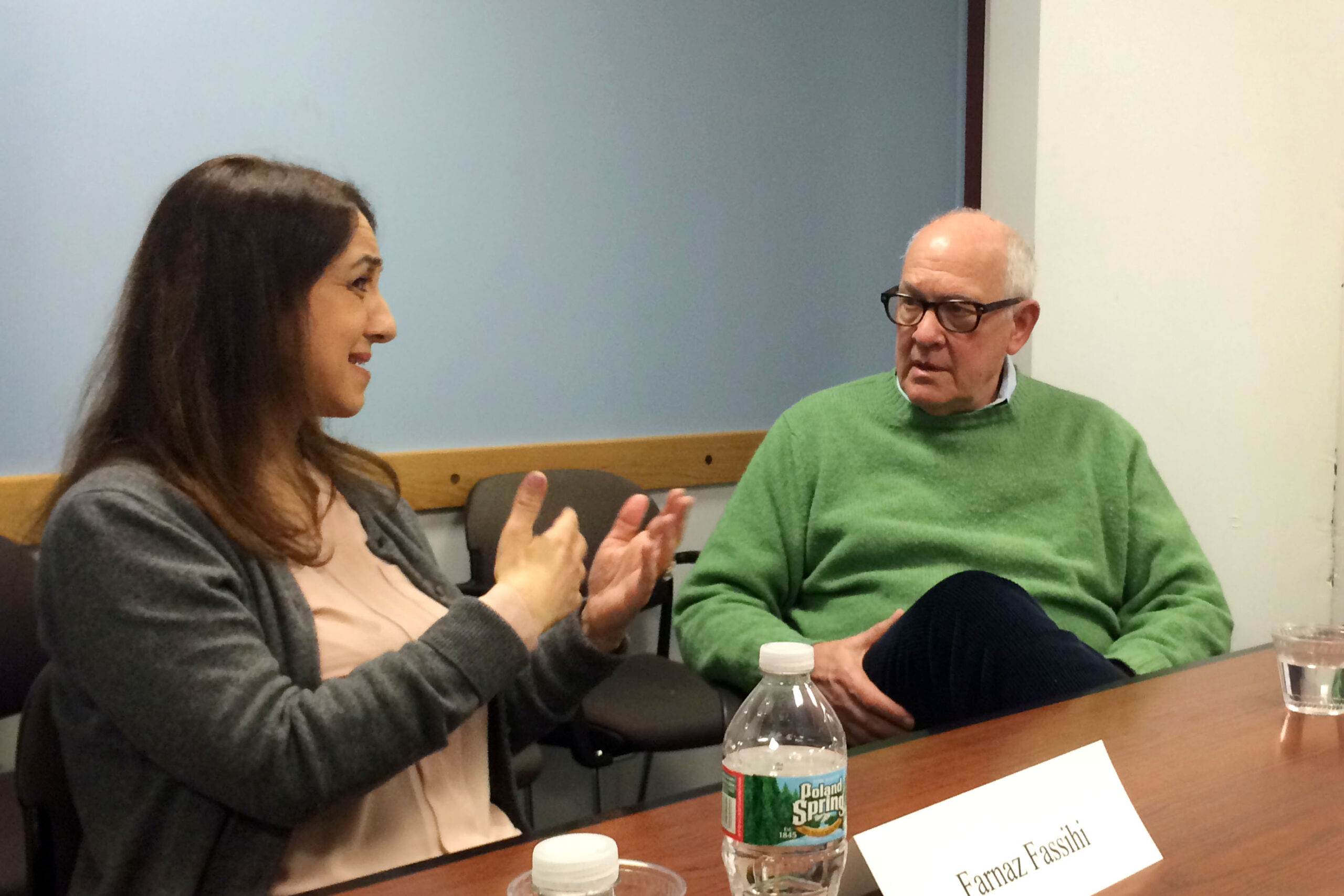Covering the Middle East has fundamentally changed in the last decade, said Farnaz Fassihi, senior Middle East correspondent for the Wall Street Journal at a Shorenstein Center event.
Increased security threats toward journalists in the Middle East and the quick turnaround times required for digital publishing have made it more difficult for Middle East correspondents to cover the region’s increasingly complex conflicts.
Fassihi was working at the New Jersey Star-Ledger on September 11, 2001, and when it became clear that the United States would intervene in Afghanistan, she requested her editor send her to Afghanistan. She hasn’t worked domestically since.
“After 9/11, there was basically no question that I would just take a backpack with a small satellite phone and go off into Afghanistan and sort of improvise my way to Kabul any way I could,” Fassihi said. “Now we have reporters armed with GPS trackers, satellite phones, and security guards.”
Because the threat of kidnappings and killings toward journalists in the Middle East is much higher, sometimes journalists don’t even go.
“We no longer send reporters to places like rebel-held Syria,” Fassihi said. “The [Wall Street] Journal hasn’t had anyone there for, I think, two years. Some areas have become no-go zones.”
Fassihi, whose reporting focused on the human face of the wars in Iraq and Afghanistan, has struggled to produce the same sort of coverage for the Syrian conflict.
“[Security issues] have taken some of the serendipity out of reporting,” Fassihi said. “It also makes it a lot harder for us to see what’s happening on the ground. If you can’t see yourself, you have to rely on other sources, and they often have an agenda. It takes a lot of time to verify them.”
News outlets have also missed big stories because of the lack of access to no-go areas.
“We all missed the takeover of Mosul,” Fassihi said. “We had all been following ISIS and saw they were making inroads into Iraq, but when Mosul fell, we were all shocked. I think it was because of our lack of access.”
The 24/7, quick turnaround times of today’s digital and mobile media landscape have also changed Middle East coverage, making reporting less original than it was a decade ago, Fassihi said. “When you’re sitting behind your desk in Beirut covering Syria, you’re all watching the same YouTube feed and the same Twitter feeds, so the pieces you publish kind of cancel each other out.”
Because of this, it has become more of a challenge to make readers care, Fassihi said, and a U.S. readership that cares is especially important in the face of the United States’ role in the region.
“The U.S. invasion of Iraq has gotten us to where we are today, which gives us more of an obligation to cover it,” Fassihi said. Before the U.S. intervention, terrorist organizations did not have as big of a presence in Iraq and Syria, but the two countries have since become a breeding ground for such activity because of the instability the U.S. intervention left in its wake. “There’s more responsibility on our part, the part of American news organizations, to try to stay on the ground and make sense of what’s happening and try to cover it.”
Since she first moved to Afghanistan with the Star-Ledger, Fassihi has covered Middle East conflicts until her recent return to the United States to be a Nieman Fellow. She has covered the war in Afghanistan, the second intifada in Israel, the war in Iraq, the 2006 war in Lebanon, the Arab Spring, and everything in between.
“I’d always wanted to cover wars,” Fassihi said. “I think perhaps because my own personal trajectory had been altered by a revolution in Iran when I was 8 years old and war with Iraq, which had made my family immigrate to the United States. These things were very much a central part of my identity and something I had grown up with, and I think I wanted to make sense of it as a reporter.”
In regard to the future of the region, Fassihi is not hopeful that an end is in close sight for today’s conflicts.
“In terms of where the Middle East is going, I’m not optimistic at all,” Fassihi said. Sectarian and ideological conflicts are no longer isolated within state boundaries, but are regional conflicts, ensnarling actors from Afghanistan to Tunisia and beyond.
Despite the seemingly grim outlook, however, covering the Middle East comes with bright spots.
“Some of the most gratifying moments as a reporter have been encountering the resilience of people and of the human spirit in war zones,” Fassihi said. Between attending a high-security wedding in Baghdad during the height of the war and working with a woman who educated girls in her basement for five years under Taliban-ruled Afghanistan, Fassihi has seen firsthand that people find a way to live with dignity no matter how hard life gets, and that is something to be optimistic about.
